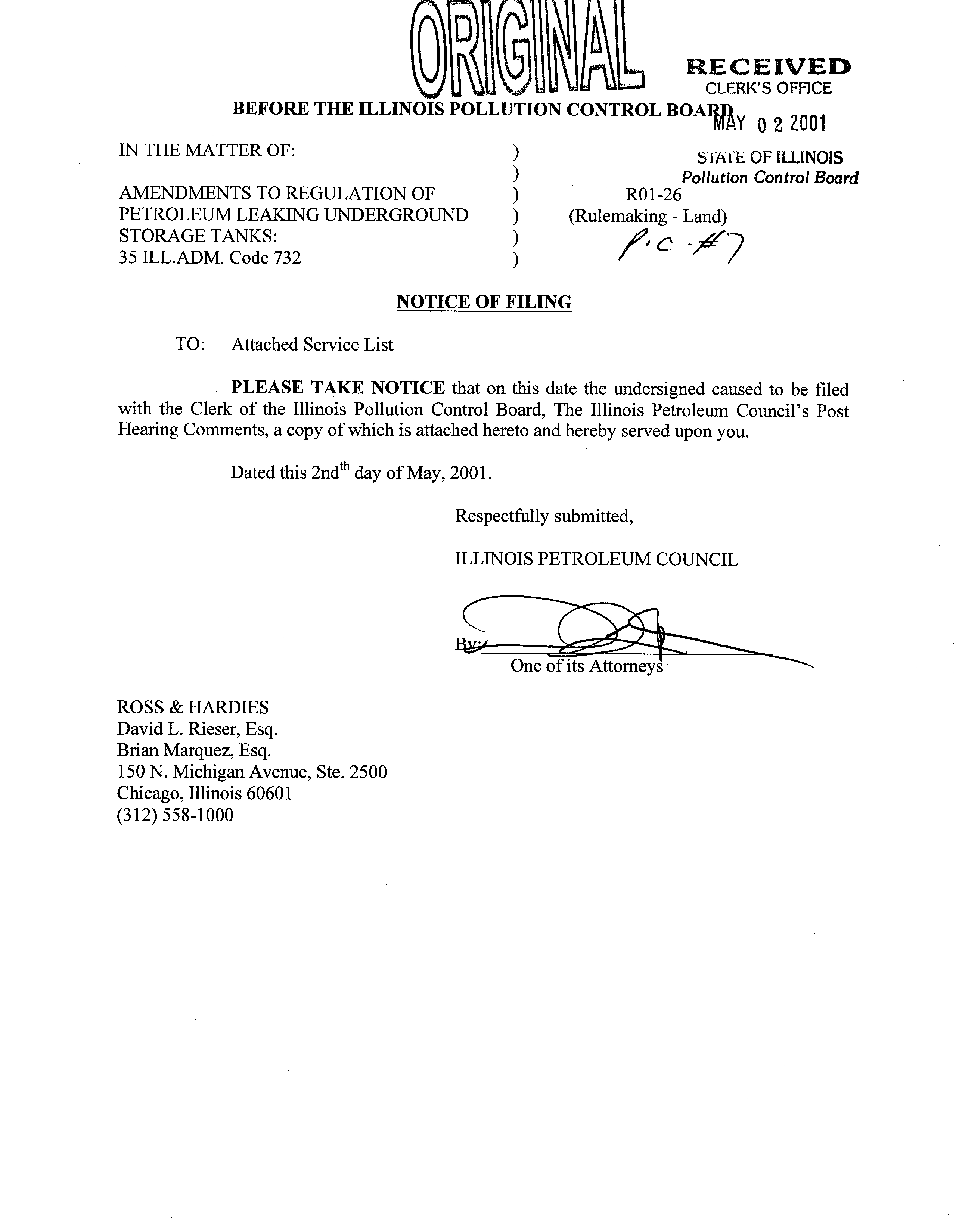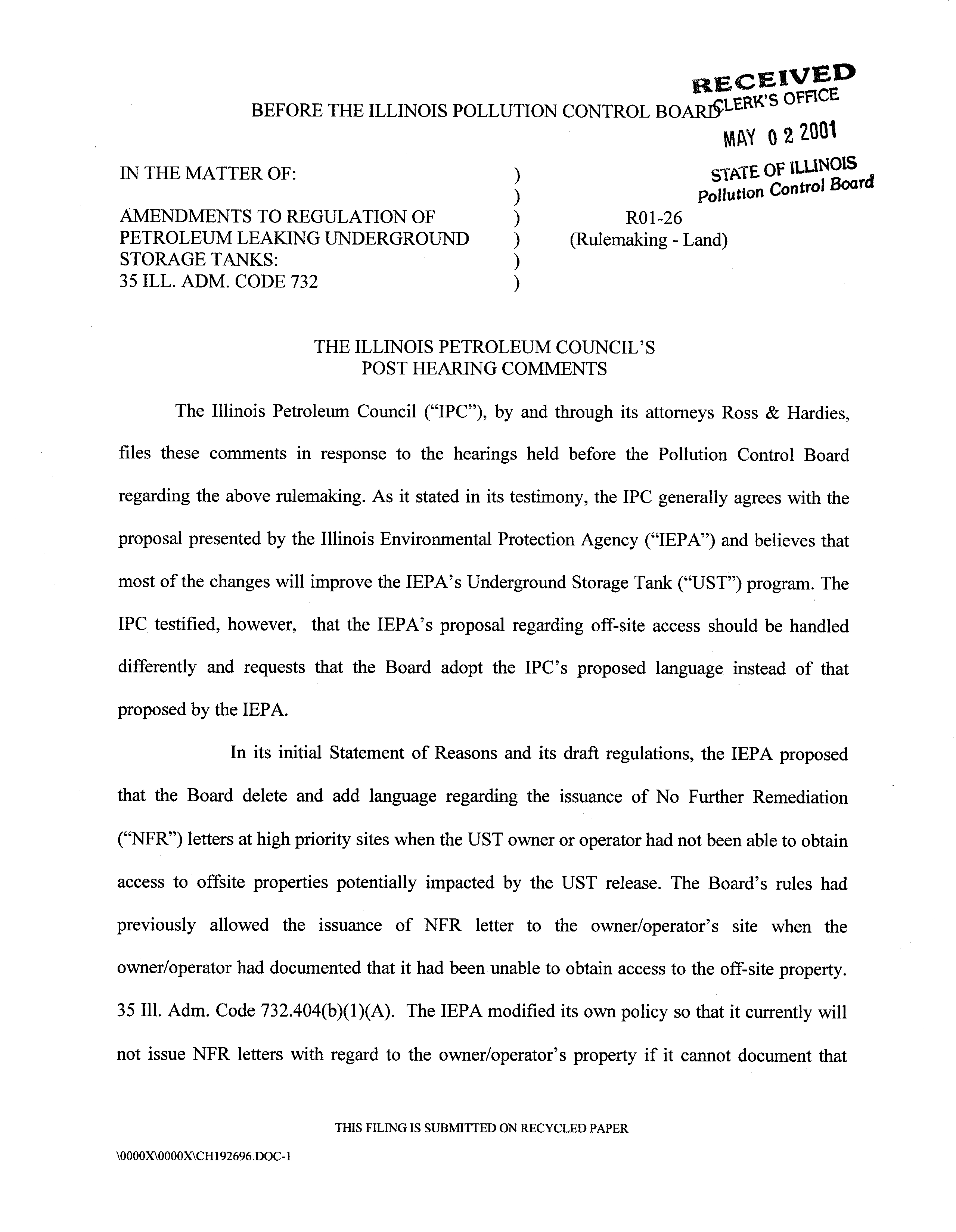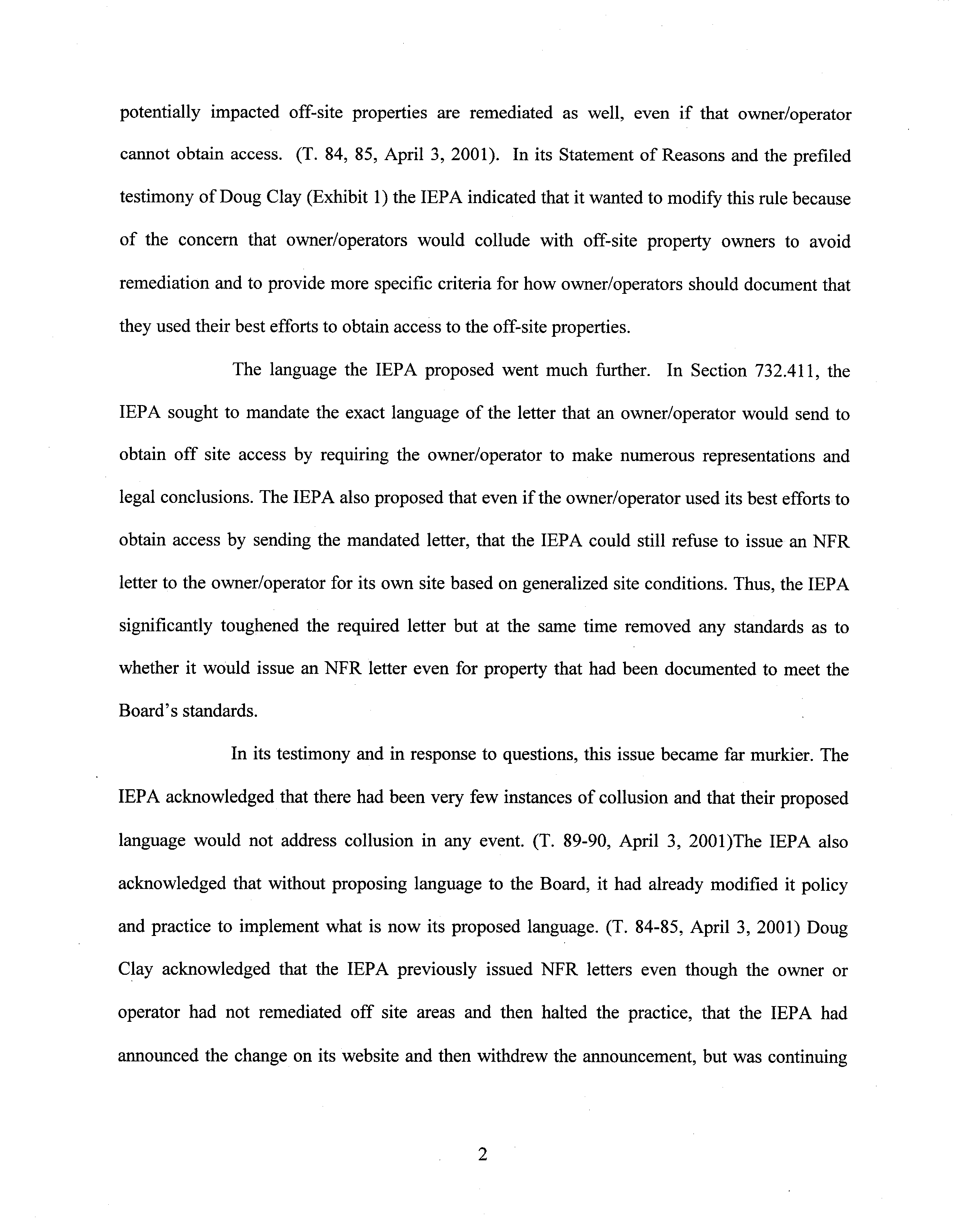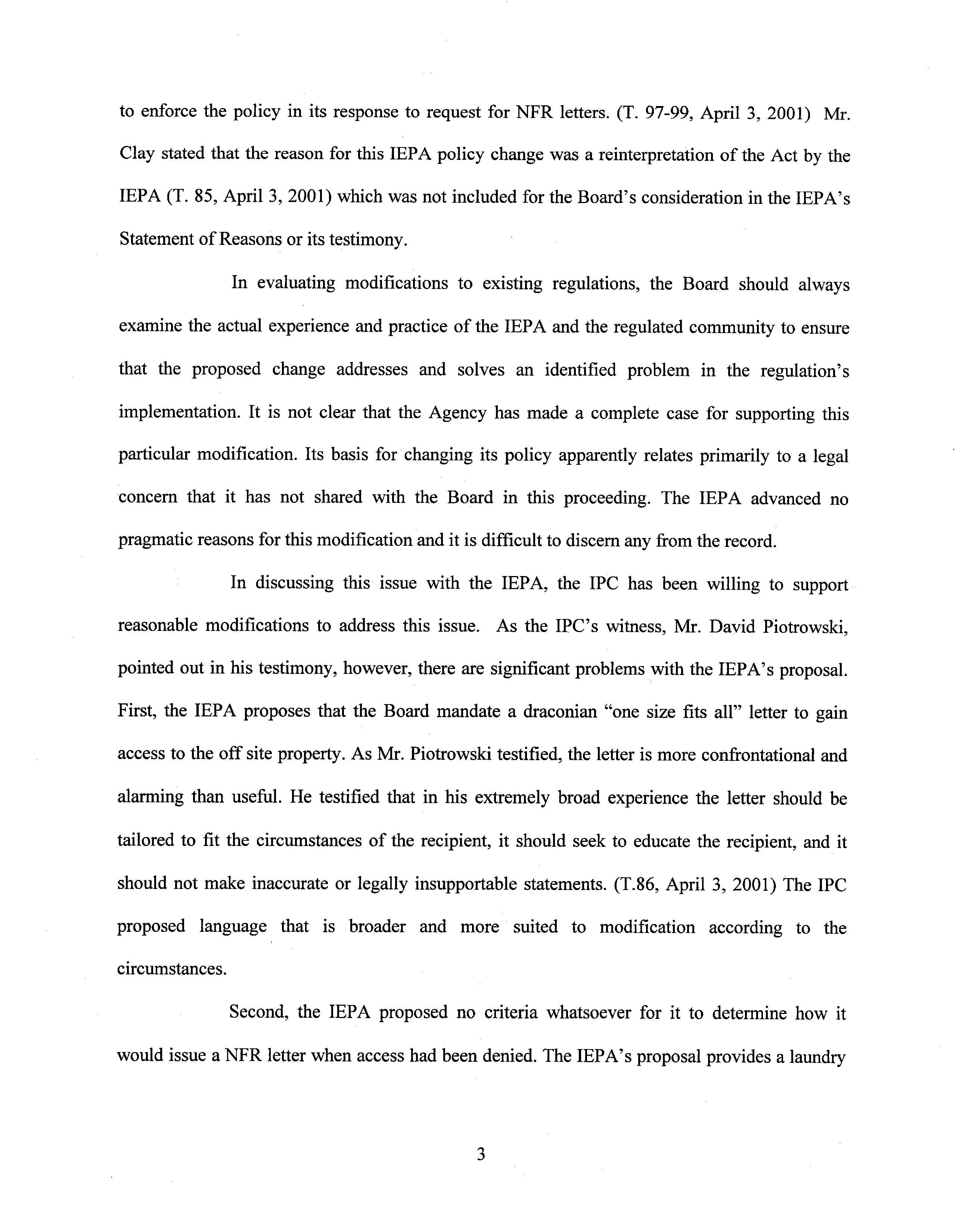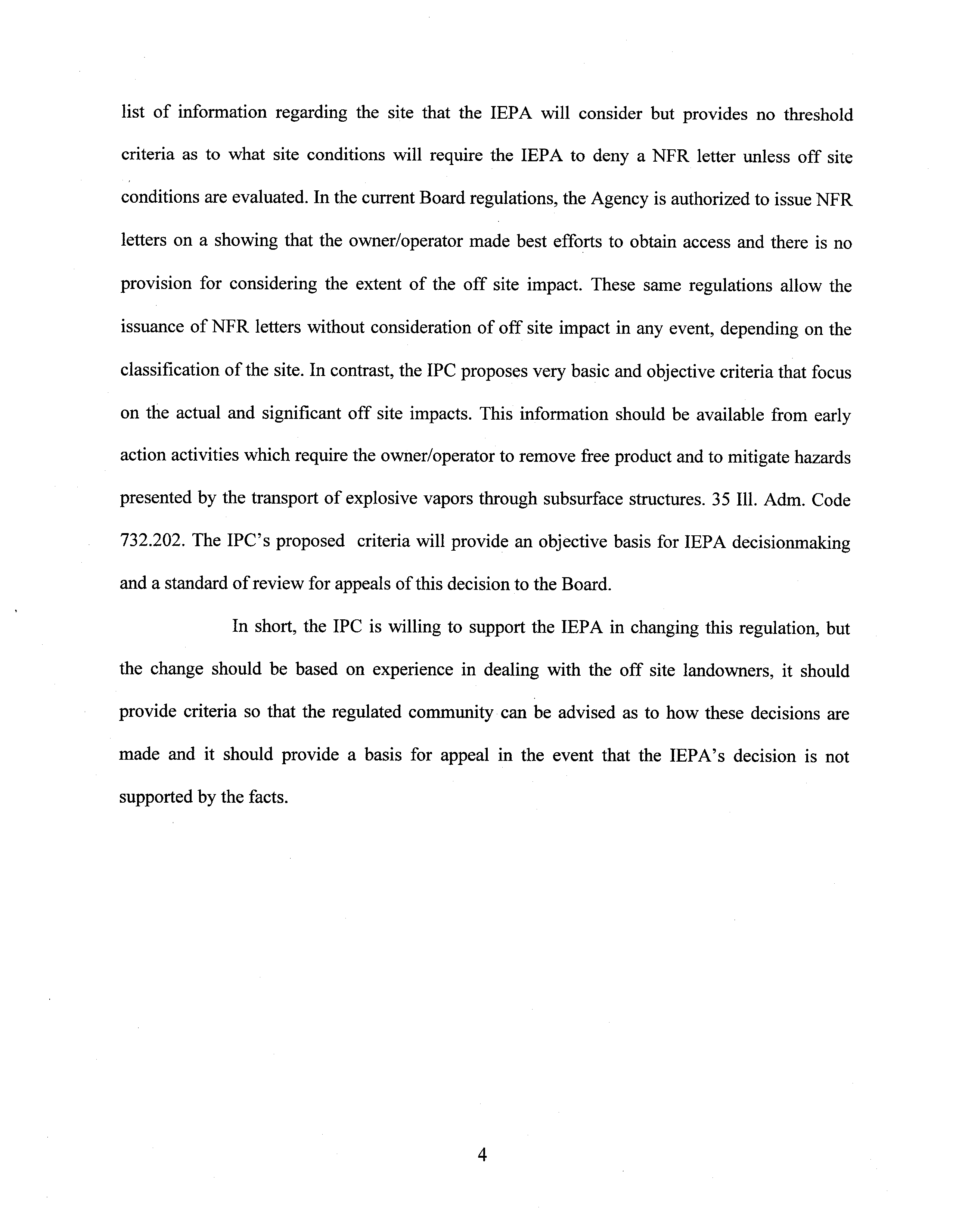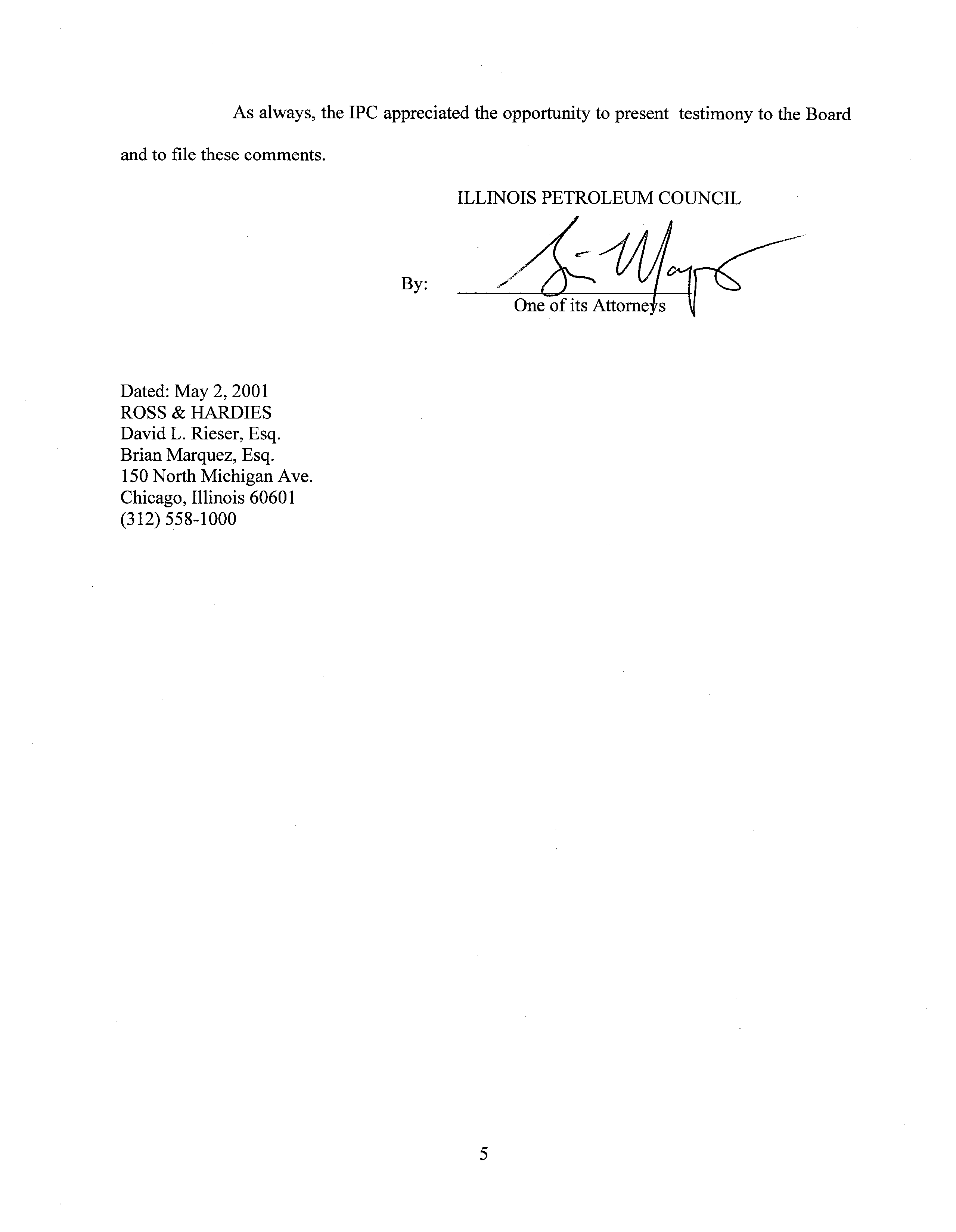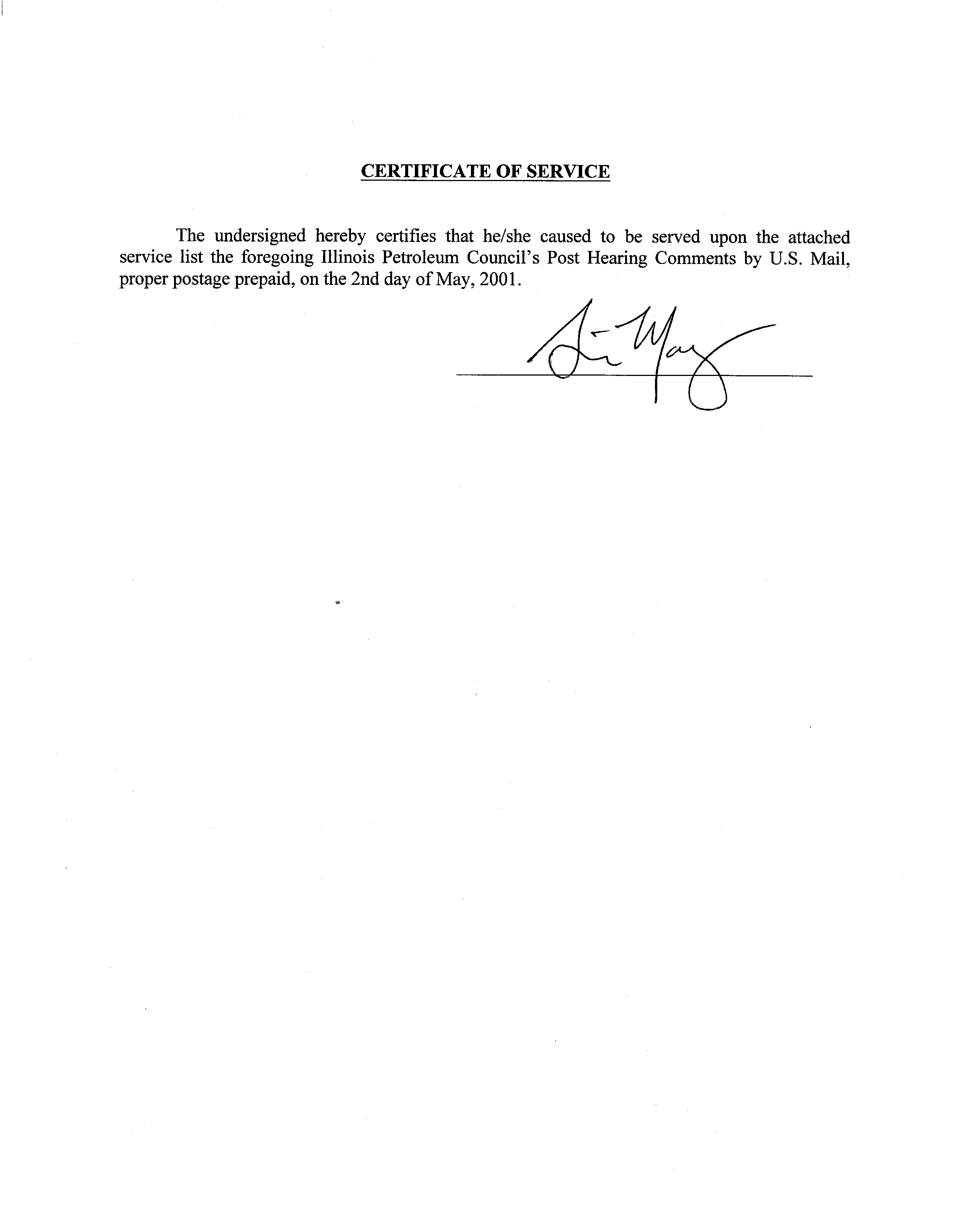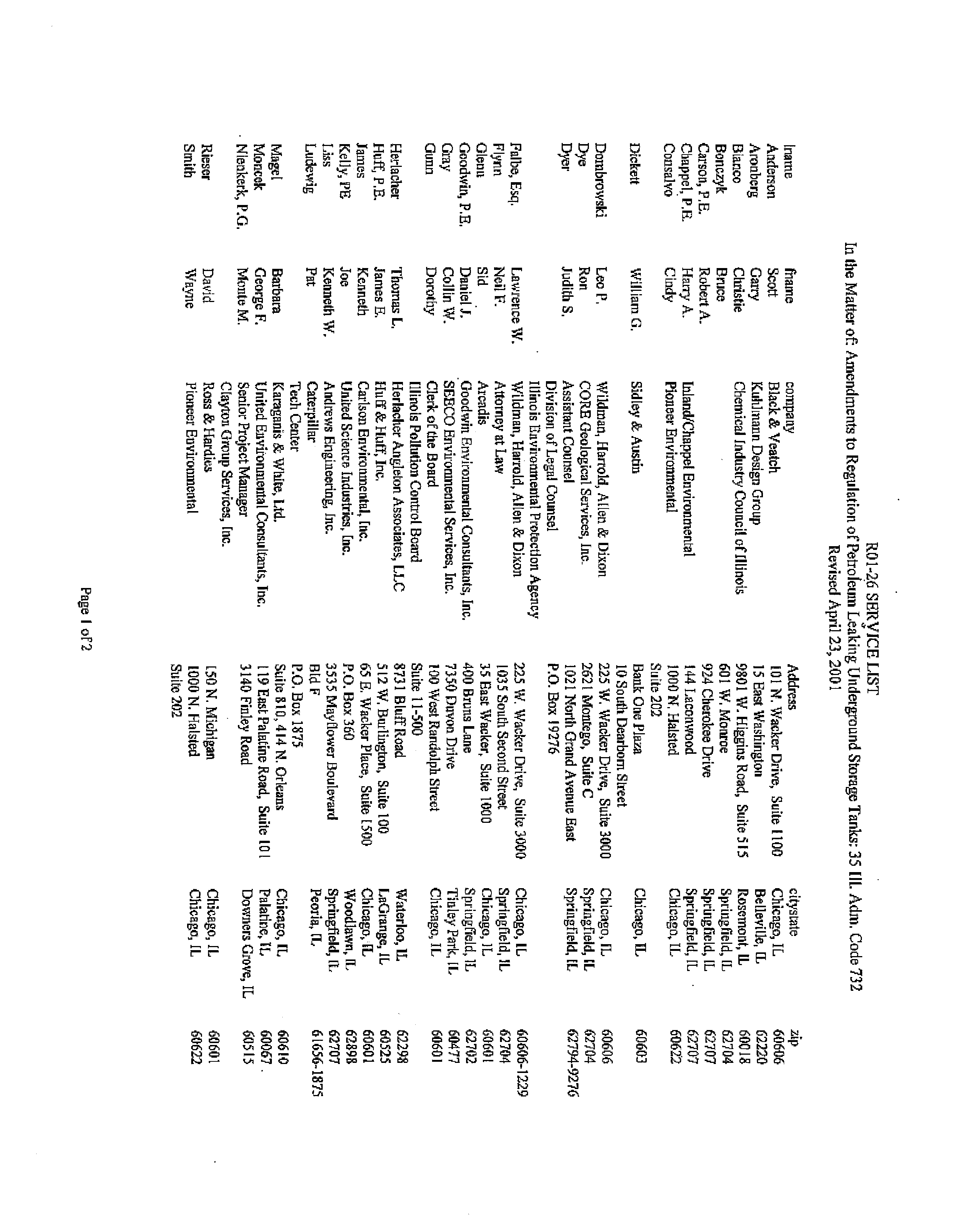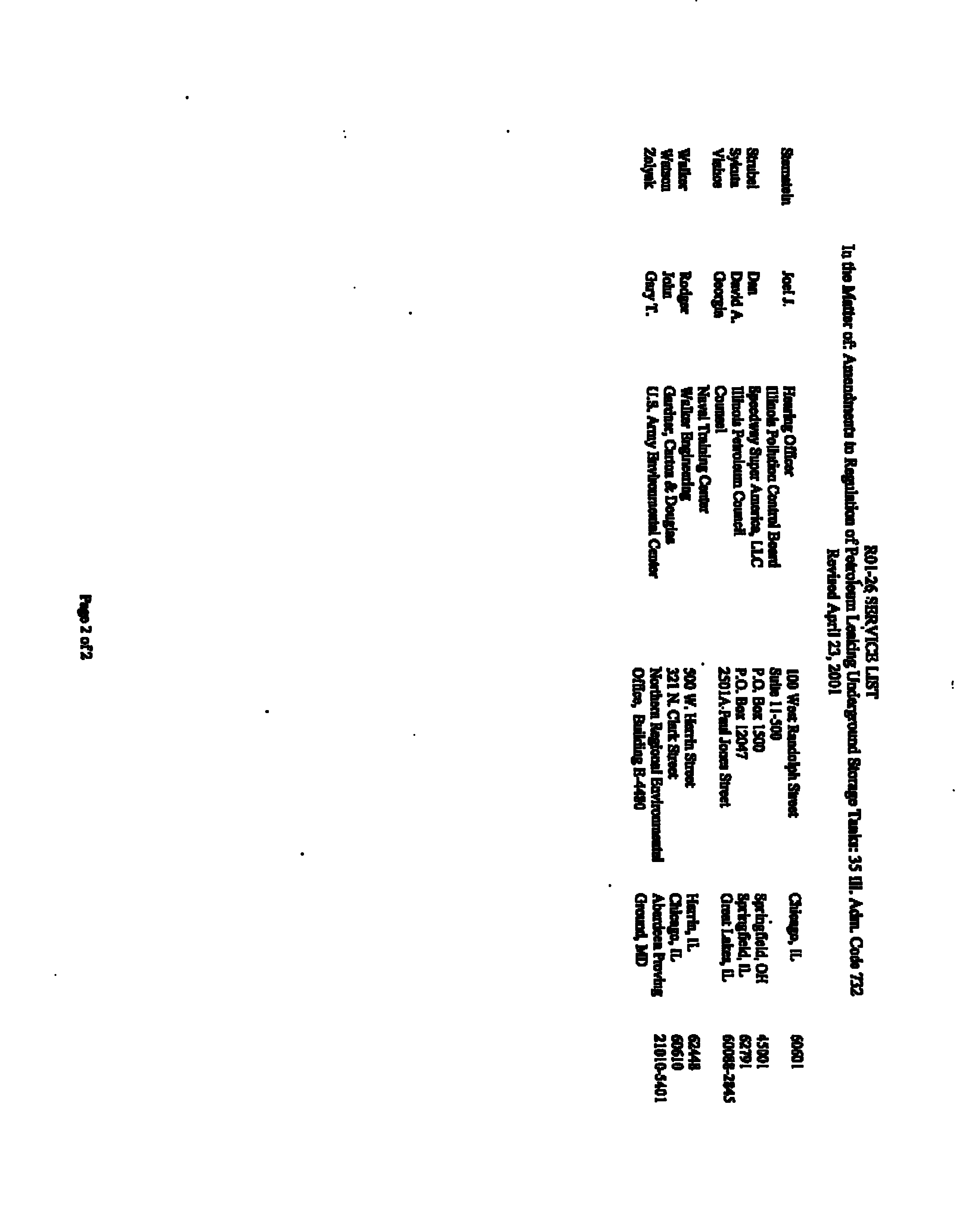RECEIVED
BEFORE THE
BOAR~~
02
zaoi
CT
ERK’S OFFICE
ILLINOIS POLLUTION
CONTROL
IN TIlE MATTER OF:
)
STAiE OF
ILLINOIS
)
Pollution
Control Board
AMENDMENTS TO REGULATION OF
)
RO1-26
PETROLEUM LEAKING UNDERGROUND
)
(Rulemaking
-
Land)
STORAGE TANKS:
)
A
c
35 ILL.ADM. Code 732
)
/
NOTICE OF FILING
TO:
Attached Service List
PLEASE
TAKE
NOTICE
that
on this date the undersigned caused to
be
filed
with the Clerk
of the Illinois
Pollution Control Board,
The Illinois Petroleum Council’s Post
Hearing Comments, a copy ofwhich is attached hereto and hereby served upon you.
Dated this 2ndth day ofMay, 2001.
Respectfully submitted,
ILLINOIS PETROLEUM COUNCIL
ROSS &
HARDIES
David L. Rieser, Esq.
Brian Marquez, Esq.
150 N. Michigan Avenue,
Ste. 2500
Chicago, Illinois 60601
(312) 558-1000
RECEiVED
BEFORE THE ILLINOIS POLLUTION CONTROL BOARI~L~S
OFFICE
!~Af\Y
0
%
2001
IN THE MATTER OF:
)
STATE OF
lLL.W~OIS
PETROLEUM LEAKING UNDERGROUND
pollution
controi Board
AMENDMENTS TO REGULATION
OF
)
ROl-26
)
(Rulemaking
-
Land)
STORAGE TANKS:
)
35
ILL. ADM. CODE 732
)
THE ILLINOIS PETROLEUM COUNCIL’S
POST HEARING COMMENTS
The Illinois Petroleum
Council
(“IPC”), by and through
its
attorneys Ross
&
Hardies,
files these comments
in
response to the hearings held
before
the Pollution Control Board
regarding the above rulemaking. As it stated in its testimony, the IPC generally agrees with the
proposal presented by the Illinois Environmental Protection Agency (“IEPA”) and believes that
most ofthe changes will improve the IEPA’s UndergroundStorage Tank (“UST”)program. The
IPC testified,
however, that the IEPA’s proposal regarding off-site access should
be
handled
differently and requests that the Board adopt the
IPC’s proposed
language
instead
of
that
proposed by the IEPA.
In its
initial
Statement
of Reasons and
its
draft regulations, the IEPA proposed
that the Board delete and add language
regarding
the issuance
of No Further Remediation
(“NFR”) letters at high prioritysites when the UST owner or operator had not been able to obtain
access to offsite
properties potentially
impacted by the UST
release.
The Board’s rules had
previously
allowed the issuance
of
NFR
letter to the owner/operator’s site when the
owner/operator had documented that it had been unable to obtain access to the off-site property.
35
Ill. Adm.
Code 732.404(b)(l)(A).
The IEPA modified its own policy so that it currently will
not
issue
NFR
letters
with regard to the owner/operator’s property if it cannot document that
THIS
FILING IS SUBMITTED
ON RECYCLED PAPER
\OOOOX\OOOOX\CH192696.DOC.I
potentially
impacted off-site properties are remediated as well, even
if
that owner/operator
cannot obtain access.
(T. 84,
85,
April
3,
2001).
In its
Statement ofReasons and the prefiled
testimony ofDoug Clay (Exhibit
1) the JEPA indicated that it wanted to modify this rule because
of
the
concern
that owner/operators would collude with off-site property owners to avoid
remediation and to provide more specific criteria for how owner/operators should
document that
they used their best efforts to
obtain access to the off-site properties.
The
language
the
IEPA proposed went much further.
In
Section
732.411,
the
IEPA sought to mandate the exact language of the letter that an owner/operator would
send to
obtain off site access
by
requiring the owner/operator to make numerous representations and
legal conclusions. The IEPA also proposed that even if the owner/operator used its best efforts to
obtain
access
by
sending the mandated letter, that the IEPA could
still
refuse to
issue
an
NFR
letter to the owner/operator for its own site based on generalized site conditions.
Thus, the IEPA
significantly
toughened
the required letter but at the same time
removed
any
standards
as to
whether it would
issue
an NFR
letter even for property that had been documented to meet the
Board’sstandards.
In its
testimony and in response to questions,
this issue became far murkier. The
IEPA acknowledged that there had been very few instances ofcollusion and that their proposed
language
would not address collusion in any event.
(T.
89-90,
April
3,
200 l)The
IEPA
also
acknowledged that without proposing language to the
Board, it had
already
modified it policy
and practice to implement what
is
now its
proposed language.
(T.
84-85, April
3,
2001) Doug
Clay acknowledged that the IEPA
previously
issued
NFR
letters even though the owner
or
operator had not
remediated
off site areas and then halted the
practice,
that the IEPA had
announced the change on
its
website and then withdrew the announcement, but was continuing
2
to enforce the policy in
its
response to
request for NER letters.
(T.
97-99, April
3,
2001)
Mr.
Clay stated that the reason for this IEPA policy change was a reinterpretation ofthe Act by the
IEPA
(T.
85,
April 3, 2001) which was not included for the Board’sconsideration in the IEPA’s
Statement ofReasons or its testimony.
In
evaluating
modifications
to existing
regulations,
the Board
should always
examine the actual experience and practice of the IEPA and the regulated community to
ensure
that the
proposed
change addresses
and
solves
an identified
problem
in the
regulation’s
implementation. It
is
not clear that the Agency has
made a complete case for
supporting
this
particular modification.
Its
basis
for changing its policy apparently relates primarily to a legal
concern that it
has
not
shared
with the Board in this
proceeding.
The IEPA
advanced
no
pragmatic reasons for this modification and it is difficult to discern any from the record.
In
discussing
this
issue
with the IEPA, the IPC has
been
willing
to
support
reasonable modifications to address this
issue.
As the IPC’s witness,
Mr. David
Piotrowski,
pointed out in his testimony,
however, there are significant problems with the JEPA’s proposal.
First,
the IEPA proposes that the Board mandate a draconian “one size fits all” letter to
gain
access to the off site property. As Mr. Piotrowski testified, the letter is more confrontational and
alarming than useful. He testified that in
his
extremely broad experience the
letter should
be
tailored to fit the circumstances of the recipient, it should
seek
to educate the recipient, and
it
should
not make
inaccurate
or legally insupportable
statements.
(T.86,
April
3,
2001) The IPC
proposed
language that
is
broader and more suited to modification
according
to the
circumstances.
Second,
the IEPA
proposed no
criteria
whatsoever for
it to determine how it
would issue a NFR letter when access had been denied. The JEPA’sproposal provides a laundry
3
list
of information
regarding the site that the IEPA will consider but provides no threshold
criteria
as to what site conditions will require the JEPA to deny a NFR
letter unless off site
conditions are evaluated. In the current Board regulations, the Agency
is authorized to issue NFR
letters
on
a showing that the owner/operator made best efforts
to obtain
access
and there
is
no
provision
for considering the extent of the
off site impact. These same regulations allow the
issuance of NFR letters without consideration of off site impact in
any
event, depending on the
classification ofthe site. In contrast, the IPC proposes very basic and objective criteria that focus
on the actual and significant off site impacts.
This information
should
be
available from early
action activities which require the owner/operator to remove free product and to mitigate hazards
presented by the transport of explosive vapors through subsurface structures.
35
Ill.
Adm. Code
73 2.202.
The IPC’sproposed
criteria will provide an objective basis
for IEPA decisionmaking
and a standard ofreview for appeals ofthis decision to the Board.
In short,
the IPC
is
willing
to
support
the IEPA
in
changing this regulation, but
the change should be based
on
experience in dealing with the
off site landowners, it
should
provide criteria
so that the regulated community can be advised as to how these decisions
are
made
and it
should
provide a basis
for
appeal
in the
event that the IEPA’s decision
is
not
supported by the facts.
4
As always, the IPC appreciated the opportunity to present testimony to the Board
and to file these comments.
ILLTh.TOIS PETROLEUM COUNCIL
By:
Dated: May 2, 2001
ROSS &
HARDIES
David L. Rieser, Esq.
Brian Marquez, Esq.
150 North Michigan Ave.
Chicago, Illinois 60601
(312) 558-1000
5
CERTIFICATE OF SERVICE
The undersigned hereby certifies that he/she caused to be served
upon
the attached
service list the foregoing Illinois Petroleum Council’s Post Hearing Comments by
U.S.
Mail,
proper postage prepaid, on the 2nd day ofMay, 2001.
Z
_
U
U
flOflww>>-~-
~
Ewow
_
00
Cj4~
~
~
-
~
—
—
CDa%~
0
-
C
-
~0
0.-~0p~•
~
m
p
~I2
—
~Qow
a
5;
5;L;I1~
-.
—
F
C
‘-C
::0ncI5c7~
a
i~-~
2.~
0
~
a
m
~
-4
r.
.~
r’
e~.
g
~
Sn
‘-4
0P~
C
p
C
wncmzr”
o
a
~
a
~
~
CD
‘a
C
~
C) ‘a
•~
CD
Lfl
•C
=‘
0~
C~-
‘-fi
a
-
a~
~
~a
_
~
pp
~
w~
a
‘~
Ca
p
B
CD
a
C
~CtA
——•
in.
t.A—
C’.aOviON)
OONtJCw
mV-~-i’JCOOU,C~
~co
.r~.~opO
O~DaFrovhc
ts.ii.n
~
rr~
me
—
W
,~
a-
4
‘-0042’
tti.a-in—
a.
~2k4
CD0~5~
-~
—a-
-
a
a
a-
‘
a
a~
-~
~
C
is
—
0-,
0
.P
C~
‘a
>““CCfl
CD
~=.c
‘OF
CCDsD~
~
3
5.s~
~
CD~~
go
~
a-
-~
Co
s.
e
car.
~0
a
—.
—o
0
—
—.
0
—
—
a
CD
—
a
~O
—
C
S
00
C~0
p-p-
~
oOc
Ce
-,CDQ
rr
C
H
0-.~cnn’a0
—‘-0
p-”0
=-
a
-!
—,
j~t~ot~
p
‘-e
~
~
=1
o
~CD
CD-
Cfl~0fl
C
~
00r
—.
—.
n
0
2’
lTOOOoo
(to
~1~1o
0
CD
0
eeF~
C ‘a ‘a ‘a~
w
C
~2.
F
a a
_
-; -;
Ca
2
5• j•CD
~
Ca
rio O~
~
Zip
2.
O
~1 ~
0
0 a
CbCDCDa
0
-
0% 0%
0%
0% 0%
cc
ccc
0’~0%
‘J~O0%
in—JO
C’ C’ 0~
O~ O~
0~
—
C,) b) C
0
~
0% —4
‘a C’
LA
N)
in
0
‘00
t4 ‘0
20
-J
in
0% 0% 0% 0% 0%
0%
0
0%
N)
“3
‘0
0% 0%
0%
4-4
t’Q C
‘—1
—1
0%
‘-0 ~
C
‘.0
0%
0%
C’V%O~0%0%0%0%N
o
C
b-li-)
10
0
N)O.~
0% 0%
-.4
—4
—10
a,
Li
t-3’-4-4.P..OcOC’
~“2
a
-30>
C
fl
~
~
=0
‘aC >
>
I~ ~
C
>0
CD
g
~.
~
—
-.
‘flow
pmZa”~fltiA
cpr~P~C)~
n2~
-;
C
—.
~
00
‘a
>~
>jO
~>
—~
~
44
~
~-
~o—
P
-~
C
6’~
~C ~0
a
-
a
P.1
~
r
Op
0
C)
p
CD
C’
-v
a
Cs
a
0
-5
C-,
S
a
C
F”
S
a
a
0~
CD
P
-4
(-C
0
a
Go
2’
p
C
4-s
-c
~—
—~0’
412
—~
a~
•~
~
Is
a
a-
Co
C
a
p
a
La
in
a.
C
0
0-
CD
La
N)
*111111
U.
I
I
if
I
RI
[I”
J~i
~“
iii
j!’~~
~r’
r’i
1
A.
‘a
1111
KIff
I
I;Fr
F
U
pP~
U.
a.
tame
sea
a
I
